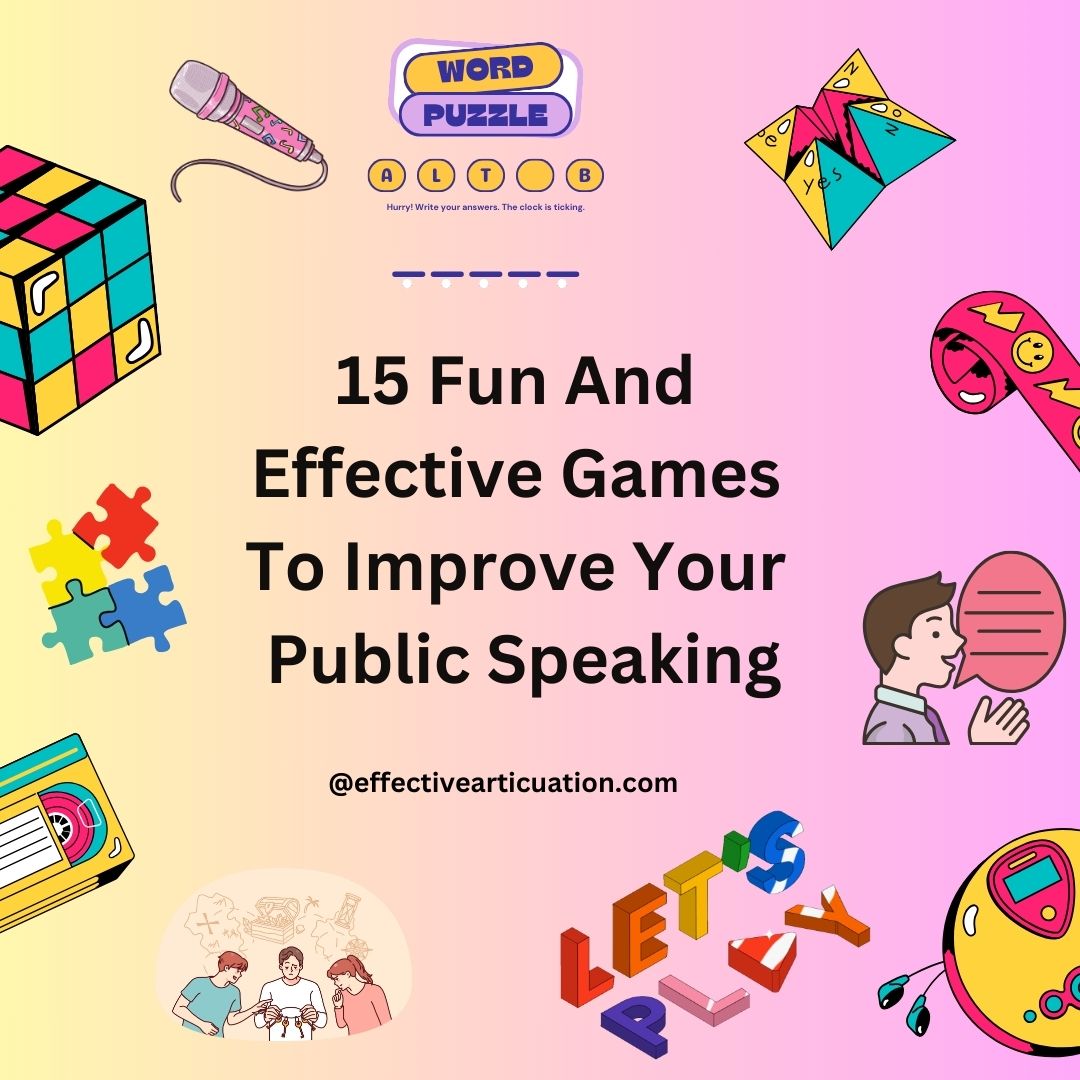Public speaking doesn’t have to be nerve-wracking or boring. It can actually be fun, especially if you practice through engaging games!
Here are 15 creative and interactive games that will help you enhance your public speaking skills, build confidence, and improve articulation.
Whether you’re prepping for a big presentation or just want to become a more confident communicator, these games will keep your skills sharp while you enjoy the process.
1. The One-Minute Challenge
- How it works: Pick a random topic, like “the benefits of waking up early” or “why pizza is overrated,” and try to talk about it for one full minute without pausing, repeating yourself, or using filler words like “um” or “uh.” If you’re with friends, take turns picking topics and challenging each other.
- Why it helps: This game encourages quick thinking and smooth delivery, helping you eliminate pauses and fillers. It trains your brain to organize thoughts rapidly and deliver them confidently, even under pressure. Speaking without hesitation also helps you sound more professional and credible in front of an audience.
Impromptu Public Speaking Topics
2. Tongue Twister Throw down
- How it works: Gather a list of tongue twisters (think: “She sells seashells by the seashore” or “Unique New York”) and try saying them out loud, gradually increasing speed while maintaining clarity. You can make it a group challenge where participants try to outdo each other or try new tongue twisters for added difficulty.
- Why it helps: Tongue twisters are a fun and effective way to improve articulation and diction, key elements of clear communication. This game forces you to focus on enunciating your words properly, which helps prevent mumbling or rushing through sentences.

3. Story Chain
- How it works: In a group setting, one person starts telling a story with a few sentences. The next person has to continue the story from where the previous speaker left off, adding their own twist or detail. The goal is to build a coherent narrative as a group.
- Why it helps: This game boosts your improvisation skills and trains you to think quickly. You’ll have to listen carefully to your fellow participants, which also improves your ability to respond spontaneously in conversation or during a Q&A session.
4. Debate Duel
- How it works: Choose a topic and assign two opposing sides to participants. Each person gets 2-3 minutes to present their argument. After both sides present, switch roles so each participant argues from the opposite perspective.
- Why it helps: Debate Duel sharpens your ability to structure logical arguments, think critically, and speak persuasively on the spot. It also helps you become more comfortable defending your points and countering opposing viewpoints in a calm, professional manner.

5. The Elevator Pitch Game
- How it works: This game challenges you to create a concise 30-60 second pitch about a product, an idea, or yourself. Time yourself to ensure you stay within the limit, and focus on making your pitch engaging, persuasive, and informative.
- Why it helps: The ability to deliver a clear, succinct message is crucial in public speaking. Whether it’s for networking or business presentations, this game teaches you how to communicate important points in a short amount of time while keeping your audience’s attention.
6. Impromptu Speech
- How it works: Write down various random topics on pieces of paper and place them in a bowl. Each participant picks a topic at random and delivers a 1–2-minute impromptu speech on the subject with no preparation.
- Why it helps: Impromptu speeches force you to think quickly, organize your thoughts on the fly, and speak confidently even when you’re unprepared. It’s a great way to simulate real-life scenarios where you may need to speak spontaneously.
7. The Mirror Game
- How it works: Stand in front of a mirror and practice delivering a speech or presentation, paying close attention to your facial expressions, gestures, and body language. Try to maintain eye contact with your reflection as though you’re speaking to an audience.
- Why it helps: Body language is a vital component of effective public speaking. This game helps you become more aware of your non-verbal cues, allowing you to refine your gestures, posture, and facial expressions to better engage your audience.

8. PowerPoint Karaoke
- How it works: In this game, participants must give a presentation using a random PowerPoint deck that they’ve never seen before. The slides can be completely unrelated or on a bizarre topic, and the speaker has to come up with a coherent presentation on the spot.
- Why it helps: PowerPoint Karaoke is perfect for enhancing your ability to stay calm under pressure and think on your feet. It also helps you improve your improvisation skills and teaches you how to communicate ideas clearly, even when you’re unfamiliar with the subject matter.
9. Emotion Overload
- How it works: Select a simple speech or story, and deliver it in different emotional tones—happy, sad, angry, excited, etc. Try exaggerating each emotion to make it more challenging.
- Why it helps: This game teaches you how to use vocal variety to engage your audience. Learning to express emotion through your voice is key to keeping your listeners interested and conveying your message more powerfully.
Leveraging AI Prompts To Enhance Communication Skills
10. The “Uh-Oh” Game
- How it works: In a group setting, participants take turns speaking on a random topic. Every time someone says a filler word like “um,” “uh,” or “like,” the other players shout “Uh-oh!” and the speaker has to restart their sentence.
- Why it helps: This game helps break the habit of using filler words, which can distract your audience and undermine your message. It trains you to pause and gather your thoughts instead of resorting to verbal crutches.
11. Role Reversal
- How it works: Pick a famous speech or speaker, and deliver their speech as though you’re them. Mimic their style, tone, and gestures as much as possible.
- Why it helps: This game helps you explore different speaking styles and develop your own voice. By stepping into the shoes of famous speakers, you can identify techniques that resonate with you and incorporate them into your public speaking repertoire.

12. Question Roulette
- How it works: In this game, participants take turns asking each other random questions. The person being asked has to answer in a clear, concise, and confident manner.
- Why it helps: This game improves your ability to respond to questions on the spot, a useful skill for Q&A sessions or interviews. It also helps you build confidence in answering even tough or unexpected questions.
13. Word Sneak
- How it works: Write down random words on cards. The speaker’s goal is to sneak these words into their speech without being obvious. The audience has to guess which words were the “sneak” words.
- Why it helps: Word Sneak improves your flexibility as a speaker and helps you integrate new ideas seamlessly into your message. It’s a fun way to learn how to maintain a flow while incorporating unexpected elements.
Daily Practice Routine For Public Speaking – A Step-by-Step Guide
14. Pacing Partner
- How it works: Pair up with someone and practice delivering a speech or story while walking around the room. The goal is to maintain a steady pace while speaking clearly and confidently.
- Why it helps: Pacing Partner helps you get comfortable with using movement during your speech. It also teaches you how to balance walking and talking without getting distracted or losing your train of thought.

15. Charades with Words
- How it works: Instead of acting out charades, players take turns describing a word or phrase without using the word itself. The other participants have to guess what it is. The catch? You have to describe it as if you’re delivering a speech.
- Why it helps: This game helps you refine your descriptive language and learn how to clearly communicate concepts. It’s also a fun way to practice engaging your audience with vivid, compelling descriptions.
Become a better speaker today!
Final Thoughts:
Public speaking doesn’t have to be daunting when you incorporate games into your practice routine. These activities not only make learning fun but also help you develop essential skills like quick thinking, clear articulation, confident delivery, and audience engagement.
Whether you’re prepping for a speech or simply want to boost your communication skills, these 15 games will make the process enjoyable and highly effective!
I hope you found this post helpful! Please let us know what you think by leaving a comment below.
If you have any topics, you’d like to cover in future blog posts, please share your suggestions in the comments.
Disclosure: If you click on the affiliate links provided in this article and purchase the product, I will receive a small commission from the company of the product. You will not pay anything extra for your purchase. You can read the affiliate disclosure for more information.



10 thoughts on “15 Fun And Effective Games To Improve Your Public Speaking”
Incorporating play into skill development can make learning so much more engaging and less intimidating. I am a believer in this school and built a whole business model around it. I especially liked the idea of ‘Story Cubes’ for spontaneity and creativity in speech. Learning should be fun, when fun is induced in the process of learning the results are amazing, and I have seen this firsthand.
It’s fascinating how these activities not only help with public speaking but also boost overall confidence and quick thinking. I’d love to hear from others who have tried these games—what has been your experience? Have you noticed improvements in areas beyond public speaking, like in everyday conversations or during meetings? Sharing success stories or tips on how to get the most out of these games would be incredibly valuable!
Thank you for your wonderful insights! I completely agree incorporating play into skill development can transform the learning experience and lead to amazing results. ‘Story Cubes’ are a fantastic tool for encouraging spontaneity and creativity, and it’s great to hear that you’ve built a business model around making learning fun. When we enjoy the process, the growth feels natural, and I’ve also witnessed how this approach builds confidence and quick thinking.
Hey Kavitha,
You nailed it with your piece on how to make public speaking way less scary and way more fun! It’s like you’ve turned it into a game where you get better every time you play. Super cool!
Your ideas of using games like PowerPoint Karaoke and sneaking random words into talks are genius! They’re like the surprise moves in a video game that test and build your skills on the fly. It reminds me of how martial artists get better by facing new and unexpected challenges in their training.
But this gets me thinking, how can we tweak these games to make sense for different groups of people or different job scenes? What about when you’re talking to an audience live versus chatting through a screen? And what about shy folks? How can we make it easier for them to step up and shine?
With all the tech we’ve got nowadays, maybe there’s a way to use AI to customize these games and give feedback that helps everyone improve over time.
Your article isn’t just a bunch of tips, it’s a whole new way to look at public speaking, with tons of curiosity and bravery. It’s like an open invitation to not just get good at speaking, but to enjoy the ride.
Thanks a bunch for sharing your insights and making communication a thrilling adventure!
Cheers to speaking up and having fun with it!
Eric
Hi Eric,
Wow, thank you so much for your kind words! I’m thrilled that the piece resonated with you, and I love how you’ve captured the essence of turning public speaking into a fun, skill-building game. Your analogy of martial artists training with unexpected challenges is spot on and it’s all about pushing boundaries while keeping things exciting and fresh!
Thank you again for your insightful response.
Kavitha
Those are very unique tips on communication. A merger between better communication skills and group party games. I’ve never seen this type of approach. It would be good for introverts like myself too. These games would force people out of their comfort zone and help them open up. (I like the game that’s kind of like “Telephone”, where people keep adding on to a story.
Thanks so much for your feedback! I’m glad you found the communication tips and group games idea unique. The ‘Telephone’ game is such a great example of how storytelling can improve articulation and listening skills while keeping things lighthearted. It’s amazing how much we can learn about expressing ourselves when we’re just having fun!
These are definitely excellent exercises. I like the mirror game because you actually get to see yourself doing the act. I think, and this is just me, that seeing yourself or watching yourself put out value is like setting an example for yourself that you are already successful. I know this has to deal with public speaking and this is my next goal. But I had to send a foundation for myself in knowing that I do have value. Reading this helped me to understand that I need to continue hearing and seeing myself act in the direction I want to go. 🙏
Hi Robert,
Thank you for sharing such a thoughtful reflection! I completely agree seeing yourself in action through exercises like the mirror game can be empowering and a great way to reinforce your self-worth and abilities. I’m glad this article resonated with you and helped strengthen your confidence in moving toward your goals. Keep up the great work, and best of luck on your public speaking journey!
This article does a fantastic job of making public speaking fun and accessible by introducing creative games that enhance essential communication skills. I especially appreciate the variety of activities, like the “One-Minute Challenge” and “PowerPoint Karaoke,” which offer both beginners and experienced speakers a way to improve their confidence and quick thinking. It’s refreshing to see such an engaging approach to a skill that can often be intimidating. These games are not only effective but also enjoyable, making public speaking practice something to look forward to!
Thank you for your enthusiastic comment! I’m so glad to hear that you found the article’s approach to public speaking both fun and accessible. It’s true public speaking can feel daunting, but creative games like the “One-Minute Challenge” and “PowerPoint Karaoke” can really turn practice into an enjoyable experience. It’s wonderful that these activities resonate with both beginners and experienced speakers, helping build confidence in a lighthearted way. I appreciate your kind words and agree that making practice enjoyable is key to improving communication skills!
Thanks again for sharing your thoughts!